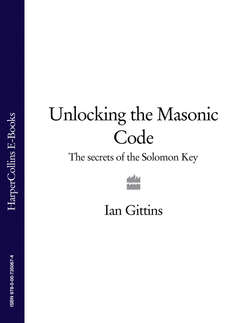Читать книгу Unlocking the Masonic Code: The Secrets of the Solomon Key - Ian Gittins - Страница 7
What is Freemasonry?
ОглавлениеFrequently described as a ‘peculiar system of morality veiled in allegory and illuminated by symbols’, Freemasonry remains the largest and most high-profile/notorious secular fraternal society in the world. While it is known to have descended from the stonemasons’ guilds of medieval times, as we shall explain in depth in Chapter 1: The Real History of Freemasonry, some argue that its lineage extends right back to the time of King Solomon—a deeply tenuous claim, but one that we shall examine in greater depth later in this book.
Few dispute that Freemasonry is in decline, with the fraternity’s membership numbers consistently dropping since the Sixties. Nevertheless, it remains a formidable organization. There are still more than five million Masons worldwide—four million of them in the United States, 500,000 in England and Wales, slightly under 400,000 in Scotland, and significant numbers in France, Canada, Australia and Ireland, as well as smaller but active chapters in Latin America, India, Japan, the Philippines and Israel.
At heart—leaving aside, for a second, its complex and intimidating historical provenance—Freemasonry is a benevolent philosophical movement. Members are taught to develop their character and altruistic instincts via a series of catechisms and ritual dramas, through which they progress through the fraternity until they are initiated as a Master Mason. The rituals and ceremonies are so arcane—and we shall detail them in full later in the book—that one almost suspects the movement’s legendary secrecy is intended primarily to save them from the howls of mockery of the outside world.
Yet setting such scepticism temporarily aside, the Masons’ motivations are largely noble ones. Initiates are told to cherish and propound the three central tenets of brotherly love, charity towards fellow Masons and the wider world, and truth. On a purely practical level, there is no denying the good works carried out by the fraternity: it is estimated that British Masons spend around £3 million per year on charitable projects. In America, the figure is nearer to $1 billion.
The Masons have suffered a degree of ridicule in recent decades due to the impenetrable rituals and extraordinary ceremonies that have defined the movement in the public imagination. Their formalities can seem ludicrously exclusive and laughably pompous. Dan Brown possibly deserves a degree of grudging recognition for his achievement in making a centuries-old, arcane grouping of pensioners and retirees appear like a dangerous and intimidating global force blessed/burdened with mystical secrets and knowledge.
Although its roots are in Christianity, the Freemasons (or ‘the Craft’ as it is often known) are a determinedly secular gathering. Members are required to pledge allegiance to a Supreme Being, but there is no obligation specifically to identify this deity as the Christian God, Allah or Buddha. During all Masonic meetings or ceremonies, this Supreme Being is referred to as the Grand Architect Of The Universe—a nondenominational philosophy that has led Masonry to be condemned by most major religions at some point in its eventful history.
Freemasons meet at regular intervals—normally once per month—in a local headquarters known as a lodge. Although these buildings are sometimes made available to the public for non-Masonic activities, they all contain an inner sanctum ritual area, laid out in a highly defined fashion and decorated with elaborate symbols, in which meetings and degree ceremonies are held. These areas are out of bounds to cynics, the curious and non-Masons in general.
Each local lodge is affiliated to a Grand Lodge, a regional over-body that serves as an administrative and legislative centre for the affiliate lodges. Yet this is about as coherent as the Craft gets. Inconveniently for Dan Brown and his fellow conspiracy theorists, there is no over-arching international body in charge of global Freemasonry: indeed, a history of various political and philosophical differences means that many Grand Lodges fail even to acknowledge each other’s existence. One is put in mind more of bickering parish councils than a furtive secret order hell-bent on establishing a self-serving New World Order.
The potential for international sedition is handicapped even further by the fact that Masons are not allowed to discuss religion, politics or any other traditionally divisive subject while inside the confines of the lodge. Nor is there any consideration of an after-life. Freemasons’ energies are directed entirely towards self-improvement on earth, a dogged quest for spiritual perfection towards which they proceed in regulated, formalized degrees.
